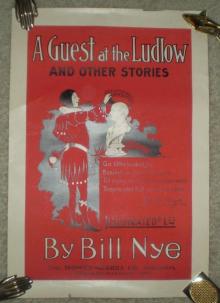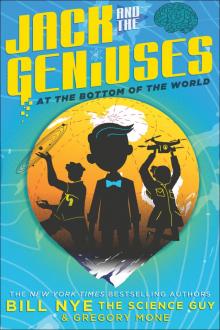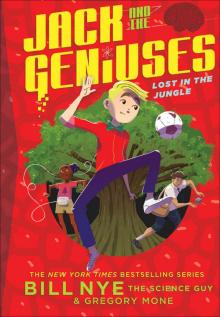Lost in the Jungle Read online
Page 7
Alicia interrupted before he could continue. “These poems are written by cats?” she asked.
“What? No. How would a cat write a poem?”
“With its paws?” I suggested. “Maybe it could have a special pen.”
“The point is, we can’t even pay our rent next month.” He stared across at Alicia and Pepedro. “So we definitely can’t hire a guide. You two are our only hope.”
“It’s impossible. We’d never find him. The rainforest is enormous.”
“But if we look for the eels, we could find Hank,” I noted.
“These eels are spread across thousands of square kilometers, an area bigger than some of your American states. Even if we did help you, we could never find him.”
Staring out the window, Alicia held up her finger again and turned toward the front. “Sorry. One minute. I need to talk to our driver. I don’t understand where we are going.”
The car slowed and turned. My sister was squinting now. She leaned toward the window and studied the street signs at the nearest corner. Alicia questioned the driver in Portuguese and shrugged when he answered. “You said someone sent you this limo?” she asked. “Who?
“Dona Maria,” I answered.
“Are you sure?”
No. Not really. My siblings didn’t look too convinced, either. “I’m not positive, but I—”
“Wait,” Ava said. She lowered her voice. “It couldn’t have been Dona Maria. She didn’t even know where we were staying until this morning. Remember? She made us write down our address when we left.”
“So then who hired this limo?”
“I’ll ask him,” Pepedro offered. He called out to the driver in Portuguese.
The partition rose up from behind the Brazilians’ seat. The glass sealed shut. The doors locked. The car turned out of the traffic and accelerated as the rain fell faster.
Alicia banged on the barrier. Matt leaned across and joined her. But our driver didn’t even react. Ava yanked at the door handle. The windows wouldn’t budge, either.
“What’s going on?” I asked. “What’s he doing?”
Pepedro was perfectly relaxed, as if we were sitting at lunch, talking about sandwiches, when he replied, “I believe we are being kidnapped.”
Reaching forward, I pulled Matt away from the glass. He was going to break his hand. Over his shoulder, I glanced at the phone on the dashboard. The screen was bright green. A white telephone icon was visible in the lower right corner. The minutes and seconds were ticking onward. I pointed. “His phone’s on speaker. Someone’s been listening this whole time.”
“Who?” Ava asked.
None of us knew. And none of us could figure out how to get out of that limousine. My sister started sorting through her backpack, searching for something that might help. Matt did the same, rooting through his canvas laptop bag. But writing a new computer program or typing an e-mail wasn’t going to save us now. In a rush, I dug through the contents of my own backpack. I had a few books about Brazil, my notebook, a granola bar, some extra cheese breads wrapped in a greasy napkin, and the Odoraser. I turned the device over in my hands. At that point, I’d used it ten or twelve times already and still hadn’t let out the contents. Thousands or even millions of airplane hair spray particles and my own personal farticles were trapped inside.
The best inventions, as I once learned from Hank, sometimes have unexpected uses. The automobile, for example, was originally dreamed up as a way to wash underpants. Only later did engineers realize it might be a good way to move people around. Okay, so that might not be true. I forget the actual example Hank gave me. And anyway, the point is that I’d never thought of the Odoraser as a self-defense weapon. But we were desperate.
Behind the boy with the million dollar foot, there was a small opening in the glass partition about the size of a bank card, and a plastic door you could slide back and forth to pass money through to the driver. Squeezing between Pepedro and Alicia, I placed the device through the plastic gap and into the driver’s section of the limo, then pressed the release button.
The Odoraser ejected its foul contents. The stench flowed throughout the front of the car. Only a few seconds passed before my farticles flooded the driver’s nostrils. He coughed. He gagged. He lurched forward like he was ready to vomit. The limo swerved. I dropped the Odoraser onto his seat as he jammed on the brakes. The driver tried the door handle, but he’d locked himself in, too. Frantically pushing buttons, he unlocked the door and struggled out into the street, breathing deeply as the rain fell all around him.
I tried the back door opposite the driver’s side. It opened. In his odor-crushed insanity, he’d unlocked everything. Alicia rushed out first. The rest of us tumbled to the curb behind her. Hands on his knees, still gathering air, the driver yelled at us in Portuguese.
My Odoraser was still in the front seat. I started to go get it, but Matt yanked on my arm. “Leave it, Jack!”
“Run!” Alicia said. “Run!”
A small, dark hole opened in my heart as I thought of my precious fart catcher lying alone on the front seat, abandoned after it had pretty much saved our lives. But I ran. The five of us tore past two restaurants and a juice bar. The rain was rushing down now. It felt like we were being pelted with hundreds of miniature water balloons. And we could run only so fast. The cracks and potholes turned the sidewalk into an obstacle course. Alicia was leading us, followed by Ava and Matt. Pepedro was right next to me, unwrapping his foot as we ran.
Then he stopped.
“Hurry!” I called back. “He’s catching us!”
The driver was ten or fifteen parked cars away from us. Pepedro turned to face him. The driver slowed his pace, wiping the rain off his brow. His orange polo shirt was already soaked through. Alicia was calling to her brother. Matt and Ava were yelling. But Pepedro was not moving. His left foot was turning over a chunk of pavement the size and shape of a baseball. His head was tilted to one side. The rain was pelting him, pelting everything, but he didn’t notice. The driver was slowly walking forward. His steps were heavy and menacing. I wanted to turn and run. Desperately. But even more than that, I wanted to see what Pepedro was going to do next.
The driver started to charge, splashing with each heavy step, and then Pepedro leaned forward, flicked the stone into the air with his left foot, waited until it dropped to the level of his knee, and struck. His leg moved like lightning, and the stone flew through the air, arcing over the parked cars before curving back to the right and striking the driver directly in the side of the head.
Instantly the man dropped to his knees, twisted, and fell forward into a puddle. The boy with the million dollar foot put his hand on my shoulder. “We will do it for free,” Pepedro said. “We will take you to the rainforest and find your friend Hank.”
7
THE VON HUMBOLDT
The next morning we trudged through light but steady rain to the Port of Manaus. Towering cruise ships were docked in the distance. Tall cranes picked up enormous, rusted containers and stacked them on the decks of boats that looked like fallen, floating apartment buildings. Each of us was carrying an overstuffed backpack filled with camping equipment, including rain gear and hammocks and ropes and all kinds of dehydrated food and plastic bowls and cutlery. My sister also insisted on bringing Betsy, and Matt found a way to cram his laptop into his bag. I didn’t bother asking why he needed a computer in the jungle.
The walk was painful because we’d barely slept. After we’d almost been kidnapped, we decided it wouldn’t be safe to stay in our hotel. So we grabbed our bags and spent the night with Alicia and Pepedro, who lived in a single-room house in a wildly crowded neighborhood called a “favela.” Their chairs were plastic milk crates. Their window curtains were old soccer jerseys. And forget beds. The place had only two small cots. Pepedro insisted on giving his to Ava, but she refused. So I took his bed instead, and I still had one of the worst nights of sleep of my life. I should’ve just hit the rug like the others.<
br />
The good news? Not only did we have guides, we’d also secured a ride down the river. As promised, Dona Maria had texted Alicia—several times, in fact—and our new friend finally called the grandmother of the iPhone and told her all about our situation. The old woman felt terrible and asked how she could help. Alicia explained that we needed a boat to take us deep into the jungle, and within thirty minutes, Dona Maria had everything arranged.
Now Alicia was leading us beneath the cranes toward the bow of one of the huge ships. Squeezed between that tanker and another, a long and narrow boat was tied to the dock. Next to the floating buildings, it looked like it had been shot with a shrink ray. But it was beautiful. The bow and stern were open, lined with polished wooden benches, and a large cabin rose up in the center, its roof scattered with instruments. We stopped a city block away.
“That’s our boat,” Alicia said. “The Von Humboldt.”
“It looks brand-new,” Matt remarked.
“Where’s the captain?” Ava asked.
We walked closer. I called out, “Ahoy, there!”
Ava glared at me. “Seriously, Jack?”
What? I’ve always wanted to yell that.
A man hurried out of the cabin. He was Matt’s height and dressed in running clothes and purple lacrosse shorts. His shoulders were wider than average, his jaw was thick and covered with a slight beard, and his hair was short on the sides and greasy on top. “Greetings! Welcome!”
Matt glanced at me. Dona Maria hadn’t told us the captain was a foreigner. I’d just figured he’d be Brazilian. He didn’t sound American, though. Or English.
“You’re Bobby?” Alicia asked.
“I am! Captain Bobby. But you can just call me Captain, lass.”
“Your accent,” Ava said. “Is that Irish? Or Scottish?”
“Bit o’ both! Welcome aboard the Von Humbert.”
“You mean Von Humboldt, right?”
“Yes, that’s what I said. Now come on, let’s go. Throw your gear downstairs. The front cabin’s mine. You can take the back ones.”
“Don’t you mean aft?” Matt asked.
“Aft?”
“Yes, you know—nautical terms. Forward instead of front. Aft instead of back. Below instead of downstairs. Starboard, port. Head for the bathroom.”
Captain Bobby eyed Matt for a moment, then ignored his comment completely. “Right, so we’ll be leaving in five minutes. No point waiting around. Dona Maria didn’t tell me where you want to go, though.”
“East,” Ava replied.
“Okay,” Bobby said. “East is easy. Why don’t you get settled in your cabins.”
We climbed a narrow, steep ladder into a cramped galley. The boat’s one head was next to the galley’s sink. Our cabins in the stern were small enough for Smurfs, and there were only four tight bunks for the five of us. Matt bumped his head on a beam, and when he managed to twist himself into one of the bunks, he couldn’t straighten out his legs. “I’ll sleep on deck,” he announced.
The engines began rumbling while we were still below. The boat lurched in reverse first, then stopped. I tripped and fell into my brother, then covered my nose. His pits needed an Odoraser implant.
“What?” he said. “I used deodorant.”
“Use more.”
The boat jumped forward before stopping again.
“What’s he doing?” Pepedro asked.
We hurried up onto the deck. Ava pushed past me and leaped over the side. Was she bailing already?
“Ava, don’t leave,” Matt called out.
She was crouching next to one of the huge metal cleats on the cement pier. “I’m not leaving,” she said. She held up a thick rope. “I’m untying us.”
Standing at the helm, our captain slid open a window and leaned out. “Good work! I was testing you, and you passed.”
Normally a compliment like that would’ve forced a smile, but Ava’s face was blank. She untied another line and climbed back aboard as the Von Humboldt steered away from the dock. Matt stood with Captain Bobby on the bridge, in front of the copilot’s chair, watching through the windshield. Behind Matt, there was a long table with a cushioned bench that wrapped around three sides. A couch that could easily double as a bed stretched out behind the captain, and the stern was open. A few chairs and benches were lined up along the sides, and a large plastic case bolted to the deck held an inflatable emergency life raft. The “Do Not Open” sign was insanely tempting, but I resisted and unlatched another plastic case about the size of a miniature fridge. Inside, three gleaming machetes were clipped into place. I started to reach for one, but my sister told me to leave it alone. “We just got aboard, Jack,” she said. “Can we avoid a stab wound?”
I grumbled and snapped the case shut.
The skies were blue and clear, so the Brazilians joined us at the stern, enjoying the air before the rains resumed. Bobby was blasting music and shaking his hips as he stood at the helm.
“Where did Dona Maria find this guy?” Ava asked.
“Quiet—he’s right there,” I reminded her.
“He can’t hear us,” Ava replied.
“He’s a little odd, but Dona Maria promised that he would take us where we needed to go,” Alicia said. “That reminds me. Do we know any more about where Hank might be?”
“We do,” Ava said.
The day before, as we hid out in the Brazilians’ small home, Ava and Matt had spent a few more hours on the computer. Now my sister finally explained what they’d been doing. After they figured out that Hank’s satellite was flying over the rainforest, they searched through a bunch of Hank’s websites and found a page that featured a map. Not just any map, either, but one of the same region he’d visited with Pepedro and Alicia.
“Can we see it?” Alicia asked.
Ava hurried below and retrieved the laptop. Matt hated when we borrowed his gear without asking, but he was too busy trying to act like a riverboat captain to notice. Back in her seat, Ava opened the screen, then made me move to one side and Pepedro to the other, to protect the computer from river spray.
“I’m not online now, but we saved the page,” Ava said, opening the file. The image was mostly the green tops of trees, with a few thin rivers winding through. But a number of small red circles were also scattered throughout the area. “See these dots?” she asked. “When we clicked through them, a list of dates popped up. Some of the dots had five or ten date stamps. Some had less. And when we clicked through a date, a close-up photo of that spot appeared.”
“What’s special about those locations?” Pepedro asked.
“I don’t know,” Ava admitted. “But this dot right here,” she said, pointing to a spot in the upper right corner of the screen, “is the newest. There’s just one date, and it was two days ago.”
“So Hank was there two days ago?”
My sister shrugged. “Maybe? I don’t know. But the oldest date in the list was a little less than three weeks ago.”
“The last time we heard from Hank,” I said.
“Right,” Ava said.
“So maybe the satellite is tracking him somehow?” Alicia suggested.
My sister shrugged. “Maybe. All I know is that if we’re going to start anywhere,” she said, pointing to the dot in the upper right of the screen, “this makes the most sense.”
Before any of us could reply, our captain yelled back at us with a smile. “What are you four doing back there?”
Ava closed the laptop. Matt caught her, and she hurried below without looking at him. I leaned over to Pepedro. “That spot Ava showed us,” I began. “Do you know how to get there?”
Alicia patted me on the back. “Of course,” she said.
The weather was kind enough to grant us a few rain-free hours. I thought we were on the Amazon itself, but the great waterway didn’t really start until two other, smaller rivers merged. We were probably a half hour into the journey when Pepedro leaned to the right—or starboard, I guess—and pointed ahead. �
�You get to see one of the wonders of Manaus, the meeting of the waters.”
The water beneath us was dark, almost black. But on the southern side, the water was a muddy, sandy color, kind of like one of the milky, sugary coffees from the plane. In the middle, the color switched from this dark black to milky brown, as if there were a thin, invisible wall stretching through the center of the river.
“How is that even possible?” I asked.
Alicia was biting her lip. “So beautiful. It’s like magic, right?”
“It’s not magic, it’s science,” Ava replied.
Then she started to explain how it worked. My brother caught us staring. He couldn’t miss a chance to show off his knowledge, either, so he joined us at the stern and added in a few details. Apparently we were cruising through an area in which two smaller rivers flowed into one another to form the Amazon. At first, though, they mixed about as well as oil and water, because the northern one is much colder and denser. It gets its dark hue from all the plants that fall into the river upstream and dissolve. “Plus it runs much faster than the southern river, the Solimões,” Matt added.
“And despite the dark color,” Ava added, “it’s one of the cleanest rivers in the world.”
“Truly amazing,” Captain Bobby said. “I didn’t know that.”
Mesmerized, we all gazed at the water.
Then I realized something.
Our captain was standing beside us.
At the stern.
I glanced toward the bridge. No one was at the helm. “Captain!” I yelled. “Who’s driving?”
“Relax,” Bobby laughed. “We’re fine! The boat drives itself. Come on, I’ll show you.” He led us to the bridge and pointed at a map of the surrounding area on a high-definition touch screen. “All I have to do is pick our first stop tonight. Then she takes us there.”
“How does it avoid obstacles?” Ava asked.
Captain Bobby shrugged. “I don’t know.”

 A Guest at the Ludlow, and Other Stories
A Guest at the Ludlow, and Other Stories Everything All at Once: How to unleash your inner nerd, tap into radical curiosity, and solve any problem
Everything All at Once: How to unleash your inner nerd, tap into radical curiosity, and solve any problem Jack and the Geniuses
Jack and the Geniuses Lost in the Jungle
Lost in the Jungle